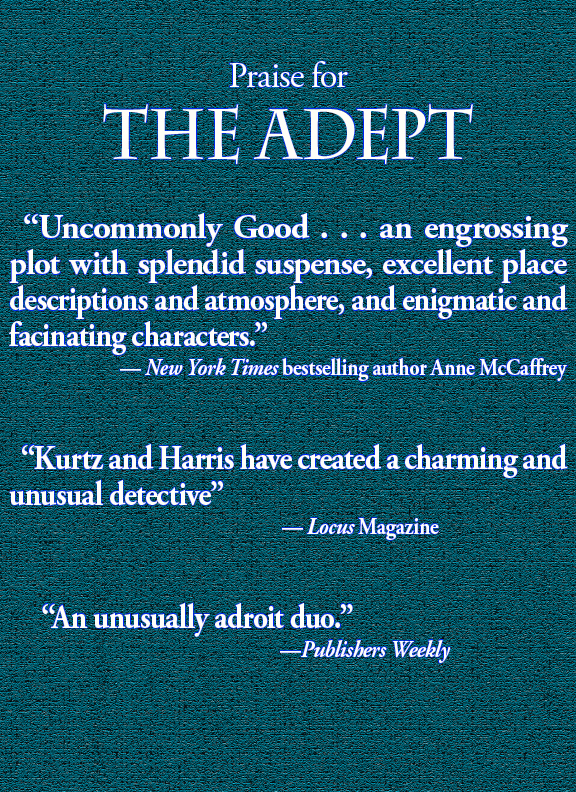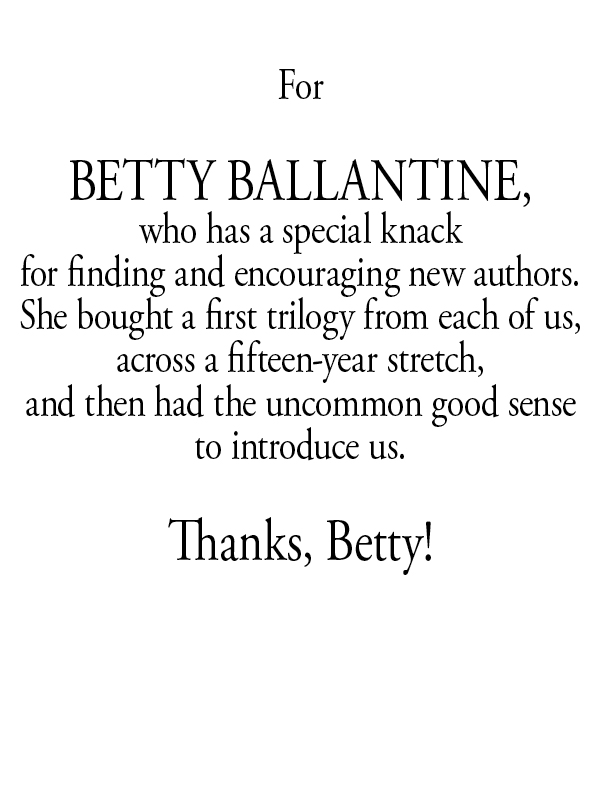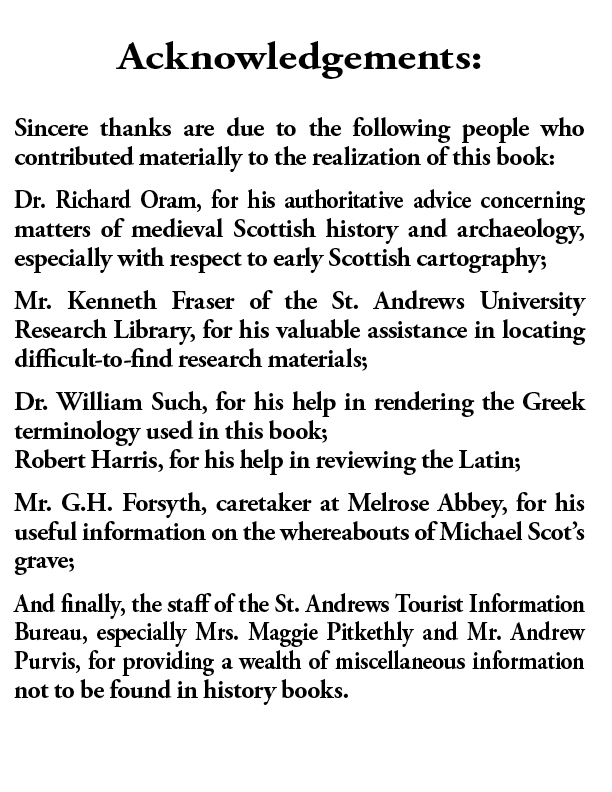The Adept
Authors: Katherine Kurtz,Deborah Turner Harris







Prologue

THE AUTUMN
night was clear and sharp, with a bite to the still air that promised frost before morning. No moon eased the darkness, but the starlight cast its own faint luminescence over the Scottish countryside.
Partway up the slope of a wooded hill, a black-clad man waited in the shadow of ancient beech trees, hugging himself against the cold, now and again flexing black-gloved hands to keep his fingers supple for the work ahead. Several times in the last half hour, he had peeled back the cuff of his left glove to peer at the face of a military wristwatch. Now he did so again. The luminous dial read half past two.
The rear windows of Mossiecairn House were blind and dark. Upstairs, the last light had gone out some time ago. The old caretaker had long ago completed his last rounds, and could be expected not to budge again from his gate lodge until after daylight. The time would never be better.
Smiling slightly, the man in black zipped his leather jacket closer and pushed a black knitted watch cap up off his ears for better hearing, flexing his fingers again as he started working his way down the slope. He covered the distance swiftly, moving with the quiet assurance of a man well schooled in night maneuvers, keeping to the shadows. A shallow burn was crossed by leaping lightly across a string of exposed stones. He paused for a final precautionary survey of the area before darting off across the open lawn, finally gaining shelter in the shadow of a porch over the kitchen entrance.
Disarming the house’s security alarms presented little challenge to the man in black. By American standards, Mossiecairn’s alarm system was woefully unsophisticated. Besides, the man in black had been in the house earlier in the day as a tourist, making note of everything that was likely to present problems when he returned.
Now he eased his way carefully across the darkened kitchen, lighting his way with a tiny pocket torch that cast a pencil-thin beam. He spared not a glance for the shelved candelabra and punch bowls and ice buckets, or the drawers full of silver flatware, as he passed through the butler’s pantry and into the dining room. Likewise disregarding a valuable tea service displayed on the dining room table, he made his way swiftly along the inside wall to the double doors at the other end. There a deft twist of a lock pick let him into the adjoining library, avoiding the outer corridor and the electric eyes guarding the doors into it.
Again he paid little attention to the many valuable items on display as he swept his light around, avoiding the windows. The portraits were particularly fine, ranging from the Jacobean builder of the house down to the present owner. The one above the ornate fireplace he had admired earlier in the day: a Cavalier gentleman in velvets and silks the color of fine port wine, with a froth of lace at his throat and the curls of a long, dark wig showing under his plumed hat.
Antique weapons and other military accoutrements studded the walls between the paintings, and smaller items were displayed under glass in a series of shallow table cases set along the walls. Rare books occupied a heavy library table in the center of the room.
The intruder passed them by without a second glance, heading for the cases flanking the fireplace. Most of the items in the cases were medals and decorations won by previous occupants of the house, or oddments of domesticity such as watch fobs and ladies’ fans and miniatures painted on ivory. A few, however, were bits of memorabilia associated with notables of Scotland’s heroic past: Bonnie Dundee or Mary Queen of Scots or Bonnie Prince Charlie. Noting one silk-tied lock of hair in passing, cased in a
golden locket of breathtaking workmanship, the man in black wondered how the Stuart pretender had managed to have any hair left at all, by the time he escaped over the sea of Skye and then took up his sad exile in France. It reminded him of all the splinters of the true Cross he had seen over the years—which, if put together, would have made enough crosses to crucify a dozen Kings of the Jews.
So he supposed the Scots could have their relics too. It mattered not to him. And the Scottish relic of tonight’s interest would bring a pretty sum.
He smiled as he approached its case and shone his light through the glass, heedless of the Cavalier watching from above the mantel. The swept-hilt rapier and its scabbard lay on a bed of dark blue velvet, elegant tributes to the ornate style favored by Italian armorers of the late sixteenth century. The gold of the hilt and guard was deeply chased, and gold-washed etching glittered on the blued blade.
The scabbard was a more modest item, executed in Moroccan leather, but several semiprecious gems flashed discreetly along its length and at the throat. Between blade and scabbard, creamy white against the dark blue velvet, a small card carried a terse three-line inscription in an elegant copperplate hand:
The Hepburn Sword
once owned by Sir Francis Hepburn
the “Wizard Earl” of Bothwell, d. 1624
The man in black breathed a small grunt of satisfaction. Taking the tiny flashlight in his teeth, he extracted a delicate lock pick from an inner pocket and probed briefly at the case’s lock. When it yielded, he raised the lid and engaged its stops. The hilt of the sword fit his gloved hand as if made for it, and he felt a thrill of imagination as he drew the weapon from the case and tried its balance, sighting along its blade where the etching caught the torchlight. Why, oh, why had he not been born a Cavalier?
Only briefly savoring the rush of excitement he felt as he picked up the sword, the man in black flourished the sword in ironic salute, to the portrait above the marble mantelpiece, then pulled the scabbard out of the case and sheathed the weapon with brisk efficiency.
The sword of the Wizard Earl, indeed! Games were well and good, but he had
not
been born a Cavalier; and if he lingered long, he might begin to regret he had ever been born at all. His employer was said to be a most exacting man, if eccentric in his tastes. All business again now, the man in black reached inside his jacket and pulled out a much-folded black nylon duffel bag, long and narrow to suit his needs. Into its open end he slipped the sheathed sword, pausing to tie it firmly closed before slinging it over his back.
Then, before closing the case and locking it again, he produced from yet another pocket a small card similar to the one already there. This one read:
Display Removed for Conservation.
After that, it was simply a matter of retracing his steps. On his way out, he showed no more interest in any of the other contents of the museum than he had shown on the way in. Once outside the kitchen door, he paused briefly to re-arm the security system, but then he faded back into the shadows up the hill, silent as a whisper, heading for the shelter of the woods and a service lane behind the house. His transport was waiting—not the charger that would have been a Cavalier’s steed, but a powerful Japanese-built motorcycle that had seen him through many an escapade since being assigned to overseas duty. His imagination transformed the black crash helmet into a tilting helm as he donned “it and wheeled the machine out of the underbrush, giving a strong push with his weight behind it. As the motorcycle rolled forward, gathering momentum on the downhill slope, he mounted on the run, letting the machine coast down the zigzag trail. Only at the foot of the hill, well out of earshot of the house, did he kick in the engine—and within minutes was oaring westward up a two-lane country road, into the frosty Scottish night.
An hour later, after an exhilarating run along the M8 Motorway, the rider was threading a more sedate course through the sleeping streets of Glasgow. Following precise instructions, he headed away from the city center on a route that eventually brought him into a wilderness of abandoned buildings in the heart of the docklands of Clydebank. The low rumble of the engine echoed dully off the cobbles as he drew up outside the gates of a disused shipyard, going suddenly silent as he cut the ignition.
The man in black removed his helmet. Five minutes passed. The man glanced at his watch, got off his machine, and began slowly pacing back and forth, keeping to the shadows. His breath plumed on the frosty, salt-tinged air, and he stifled a sneeze.
Finally, as he turned in his tracks for the fourth time, his straining ears picked up the quiet murmur of a powerful car approaching. He returned to his machine. A moment later, a sleek, dark-colored Mercedes emerged from a side alley and came to a smooth halt on the opposite side of the street. As the headlamps were extinguished, the dark-tinted windows on the right side of the car glided down in automated unison. Pale face-blurs of a driver and a rear passenger showed in the darkness.
Relieved, the motorcyclist set his helmet on the saddle of his bike and sauntered over to the side of the car. Bending from the waist, he favored the passenger in the backseat with an ironic salute and drawled, “Morning, Mr. Raeburn.”
The backseat’s occupant acknowledged the greeting with a cool nod. “Good morning, Sergeant. I believe you have something for me?”
The sergeant pulled a cocky smile, exposing strong white teeth in a face weathered by years under the Texas sun. “Christmas gets earlier every year,” he replied. “Just call me Santa Claus.”
With an exaggerated flourish he unslung the duffel bag he still carried over his shoulder. The Mercedes’ passenger elevated an eyebrow.
“Did you encounter any difficulties?”
The American gave a derisive snort. “Are you kiddin’ me? I’d have had more trouble taking candy from a baby. What folks your side of the Atlantic don’t know about security must cost your insurance people a mint.”
As he began methodically unlacing the neck of the duffel bag, the man in the backseat of the Mercedes watched his every move.
“I trust,” said the man, “that you were not tempted to exploit the situation beyond the terms of our contract?”
His tone was conversational, but there was more than a hint of steel beneath the silken inquiry. It elicited a sharp glance from the sergeant, and an almost petulant disclaimer.
“Hey, I got a reputation to maintain!”
The man in the car smiled in chilly satisfaction. “You reassure me. Reliable help is not always easy to find nowadays.”
The American did not bother to acknowledge the comment. As he jerked open the mouth of the duffel bag and drew forth the sword by its hilt, a map light came on inside the car. The light glinted off the gold and cut-steel as he passed it through the open window, point first.
“It’s a pretty enough toy, I’ll grant you,” he remarked, “but I guess you know you could’ve had half a dozen fancy swords made for half what you’re paying me to steal this one.”
His employer took the Hepburn Sword in both gloved hands, briefly drawing the blade partway from the scabbard, then sheathed it with a sigh and laid it carefully across his knees.
“An object’s worth is not always to be measured in terms of money,” the man murmured.
The sergeant shrugged. “Whatever you say, Mr. Raeburn. You’re a collector, and you know what you want. Me, I’m a—an acquisitions agent.” He savored the sound of the title on his tongue. “And us agents do what we do for the money.”
“Of course,” said his employer coolly. “You’ve fulfilled your part of the agreement. I am now prepared to fulfill mine.”
He nodded to his driver in the rearview mirror. The man in the front of the Mercedes wordlessly reached into the breast of his coat and drew out a fat leather wallet, handing it through the open window without comment. The recipient opened it casually and riffled through the thick sheaf of American currency inside, one eyebrow raised in pleased surprise.
“As you see, I have included a small bonus,” the man in the backseat said.
“Yes, sir, Mr. Raeburn,” the American said with a broad grin. “It’s been a pleasure doing business with you.”
“I think I may safely say the same.”
The man in the backseat drew the glove from his right hand. A signet ring set with a blood-red carnelian seal glittered richly on the third finger as he extended his hand through the open window.
The American accepted the proffered handshake. His employer’s clasp was surprisingly hard. The man in the car gave a savage downward jerk, and the thief found himself staring into the muzzle of a silencer—one of the sleek West German ones.
This alone the American had time to grasp, even as the man in the car pulled the trigger at point-blank range. He never heard the quiet cough of the first shot, much less the second or third.
His body crumpled to the pavement with a loose-limbed thud as his hand was released. When he did not move, his killer slipped the silenced automatic carefully under the seat and signaled his driver to go on. The sound of the Mercedes’ engine turning over was far louder than the shots had been, but neither raised any ripple of curiosity as the car crept almost soundlessly out of the Glasgow docklands.

